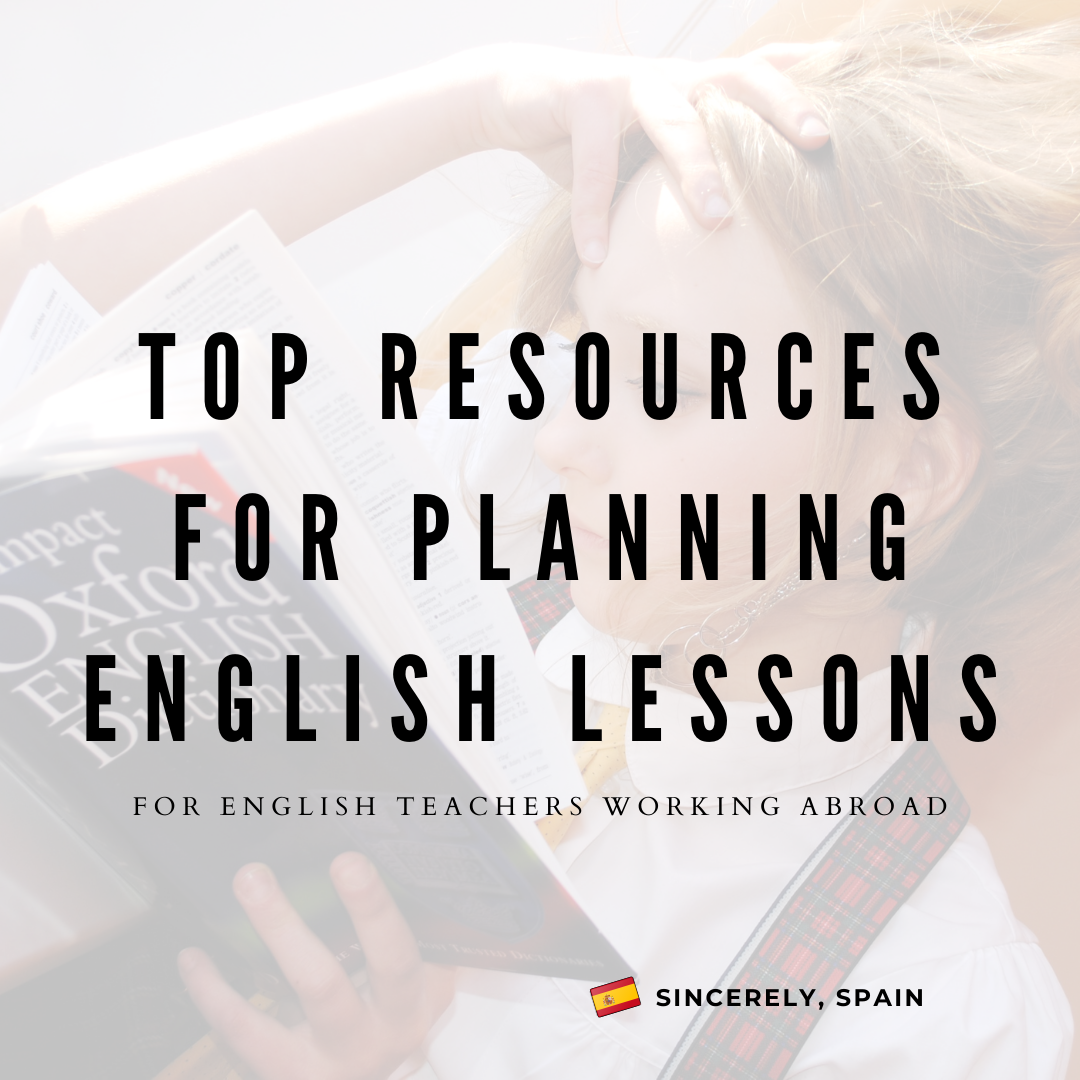
Top Resources for Planning English Lessons
 Dear Sam,
Dear Sam,
As we’ve talked about before, planning out your first English lessons can be difficult (let’s be honest, we still had struggles with this after teaching for years) and it’s especially hard to know where to get started. Thankfully, the internet is bursting with useful resources so let’s break it down into a few different categories of what you might want to include in your lessons as well as some of the best places to find the resources you’ll need!
General Ideas
Why/When you might need these:
There are literally thousands of ways to teach English, no matter the topic you want to cover in your lessons. Yet when faced with a specific area of focus, you might struggle to come up with a single original idea. Not to fear, teachers have been sharing their lesson plans and ideas online for decades and you can easily use these to get inspired.
Some of our favorite general resources:
Pinterest.com: If you still don’t have a Pinterest account, it’s worth getting one JUST for the lesson plan ideas! You can search for anything and save all of the ideas in one simple place to come back to later. It’s ideal for all those times you happen upon a great blog that has ideas for Christmas projects but that’s two months away and you’ll never remember when the time rolls around. While you’re there, why not follow us for Spain inspiration (and the occasional teaching English tool, too)?
http://www.teachingandtapas.com/blog and other teacher’s blogs: This is just one of the useful blogs we’ve found (through Pinterest) but we really enjoy happening upon teacher’s blogs as well as home-schooling parents. They are usually SO creative and they not only share their lessons but also some insight into exactly how they executed them and other advice you may find helpful.
Worksheets and other “Printables” (for Kids and Adults)
Why/When you might want to use these:
These are best for adult learners, in a group classroom setting, or for younger students you know have an ability to sit still and complete a worksheet. Worksheets and other printables are a great way to review vocabulary and grammar, while allowing your students to feel like they have accomplished something. Of course, there are many printable games, flashcards, and roleplay activities so you can find some winners for your more active students as well.
 Some of our favorite printable resources:
Some of our favorite printable resources:
https://www.teach-this.com/: This website is very well-organized into grammar, functional language, games, and teaching tips. Not only can you find many free printables (without a subscription), but also read up on what has worked (and hasn’t worked) for other teachers!
https://en.islcollective.com/: Another great site for similar resources, although you need to register for access to download their materials.
https://www.education.com/: Especially useful for young learners, this site offers material labeled by grade (PreK-5th). While the focus is not on English as a Foreign Language, we find the worksheets useful for introducing topics young students might not yet be learning in English but that they’ve learned in their native language and can start to grasp.
https://www.weareteachers.com/category/free-printables-for-teachers/: Great for ideas and advice in general, you will need to sign up in order to access the free printables.
Songs and Videos for Kids
Why/When you want to use these:
Music is one of the easiest ways to store new information and kids respond very positively to engaging songs. Whether you have students fill-in-the-blank with different activities or take this opportunity to focus on vocabulary by using flashcards with words that come up in the lyrics, songs are a great way to hold kids’ attention. Alternatively, you can choose songs that require actions or dance moves to get your kid active.
Some of our favorite audio-visual resources for kids:
https://www.youtube.com/user/SuperSimpleSongs: This YouTube channel seems to have endless videos of interactive, repetitive songs that are ideal for young learners.
https://www.youtube.com/user/LittleBabyBum: Similar to the above channel, this one is geared towards young learners and often has songs that are a bit slower than Super Simple Songs.
Search for Barney and Friends, Sesame Street, and whatever your favorite shows were as a child. We often remember (more or less) the songs from our childhood but we have found that when we try to teach these to students without any props or visual stimulation, they quickly get bored. Instead, try searching for clips from the original shows!
Songs and Videos for Adults
Why/When you want to use these:
Music is one of the easiest ways to store new information—even as an adult! While we don’t usually invite our teenaged or older students to hop around to the repetitive lyrics of songs like the ones you’ll find above, fill-in-the-blank worksheets and/or discussion topics based on the lyrics are a great way to engage with English. We really like to use songs to focus on vocabulary and also on grammar elements such as verb tenses. In this way, students will actually come to understand the songs they’re listening to on the radio, improve their listening skills, and learn lots of colloquial expressions along the way!
Some of our favorite audio-visual resources for adults:
http://www.learnenglish-online.com/listening/music.html: You can find tons of classics as well as pop songs on this site but the best part is that they’re already categorized into different verb tenses so that you can get students working on grammar in a more dynamic way. Ideal for classroom settings!
http://lessonstream.org/main-activity/videotelling/: This guy’s got a bit of everything on his blog, but the resource we’ve used most is the “videotelling” section in which he provides video instructions or video content to base a lesson on. It’s broken down into grammar or vocabulary aims as well as the level of the student (both the A1-C2 scale as well as kids, teens, and adults).
Another favorite we have found is letting the students choose their own songs and learning from what they like to listen to. Simply search for a specific song on Youtube (we recommend choosing the original music video over a karaoke-style audio with the lyrics) as well on lyrics websites like https://www.azlyrics.com/). These options are probably your best bet if students want to work with the newest songs or there’s a particular song you want to focus on.
Specific Exam Preparation
Why/When you want to use these:
Sooner or later you’re bound to have the student or class who is preparing for a particular exam and want your help to make sure they are ready. They will often want to know all of the details and have all of the practice beforehand. This can be incredibly overwhelming at first, but with time you’ll feel confident enough with the format and expectations to teach without a book!
Some of our favorite exam preparation resources:
Official Exam Websites (Cambridge, Trinity College, etc.): Always put first things first. Before you dive into the endless pool of alternative materials, check out what’s available on the official site of the exam your student will take. These are the for-sure requirements (that you should read up on as your students will likely ask you) as well as the most essential grammar/vocabulary they need to know. You can get by with just these resources for weeks, depending how often you meet with your student.
If you are teaching at a language school, you can also check out what resources the school has available for you in their library. Usually language schools will focus on a specific exam and have past exams or other resources that you will be able to use to help your students prepare. Alternatively, we have also found language learning books at local libraries that you can borrow for specific examples and additional support.
https://www.examenglish.com/: This is a go-to when it comes to additional practice exams and materials. ExamEnglish has resources specific to six different exams as well as resources to help you understand the CEF standards (all those A1-C2 labels) and grammar expectations for each level.
https://www.englishrevealed.co.uk/fce_vocabulary.php: This site specifically boasts preparation for the Cambridge exam but its long list of topics could easily be applied to any exam your student is studying for. We’ve found the word formation, phrasal verbs, and idioms exercises especially useful.
Conversation Prompts
Why/When you want to use these:
Once students reach the level needed for conversational English, it’s best to engage them in natural conversation and even debates. While you may let conversation flow in some classes, other times you are probably going to want something more specific to follow. You can look at topics and grammar related to what they’re already studying at school, seasonal topics like the holidays, or something completely new.
S ome of our favorite conversation prompt resources:
ome of our favorite conversation prompt resources:
http://iteslj.org/questions/: This site is a gold mine, specifically for questions to get your conversation started. Simply choose a topic you’re interested in and print out or pull up the list during class. It’s almost impossible to run out fuel with this one; many of the topics have over a page worth of questions!
https://freeenglishlessonplans.com/tag/debate-topics/: Tim has got lots of lesson materials available on his blog but the debates section is a good place to start. Useful expressions and techniques are provided to aid students who are new to debating as well as a handful of “low-stake debate topics” in addition to some much more challenging ones.
 And there you have it! With all these resources in your tool belt, we hope you’ll have everything you need to plan engaging lessons for all of your students. Be sure to bookmark a few on your phone for that dreadful moment when you finish with everything you had prepared and still have 10 minutes left of class. Instead of panicking, pull up some new songs (for kids) or some conversation questions (for adults) and you’ll easily fill the remaining time without letting on that you were unprepared at all.
And there you have it! With all these resources in your tool belt, we hope you’ll have everything you need to plan engaging lessons for all of your students. Be sure to bookmark a few on your phone for that dreadful moment when you finish with everything you had prepared and still have 10 minutes left of class. Instead of panicking, pull up some new songs (for kids) or some conversation questions (for adults) and you’ll easily fill the remaining time without letting on that you were unprepared at all.
Have you had success with these resources yourself? Do you have other sites you love that we should add to the list? Please don’t hesitate to help a fellow teacher out and comment with your tips!
Sincerely,
Spain







